It should be researched rationally like any other treatment and used if it works.
The underlying framework is not going to survive forever (even if it captures something useful, it does not coexist well w the rest of our modern knowledge) but some things will surely survive?— omar ali (@omarali50) February 8, 2023
No, it includes countless prescriptions (from medications/herbs to "complementary medicine") AND a theoretical framework. That framework will not coexist well w modern medicine, but that does not mean prescriptions are all wrong too.. as far as framework goes.. 1/n
— omar ali (@omarali50) February 9, 2023
Small digression of the day was in a domain I know little about (my thought was more that u shud not dismiss the products an ancient and sophisticated culture summarily,, real knowledge is captured in it, frameworks need "translation"), but if anyone has interesting links, share https://t.co/eI0Y6b9DUE
— omar ali (@omarali50) February 9, 2023
A couple of days ago i saw a tweet from @theliverdr on twitter that made fun of some recent initiative to add Ayurvedic medicine to the medical school curriculum. I don’t know what they will teach and how useful it will be in practice (as a boomer of Pakistani origin my first thought is that expectations should be low, at least initially), but I thought the summary dismissal of the entire corpus of knowledge is also unscientific and tweeted out the tweets pasted above.
My point was not so much about what the Indian medical system will actually end up teaching. It was more a philosophical point that we should not dismiss the products of an ancient and sophisticated culture summarily; there is likely to be real knowledge that is captured in it, but the framework is very different (and “pre-scientific”) and will need “translation”. As an example I mentioned Ida, Pingala and Sukhmun Naadis, channels in which energy supposedly flows along our spine. Modern science recognizes no such channels, but that does not mean that the lore built up around this theory is all valueless. Methods to manipulate these channels can still work even if the channels do not exist, but even beyond that we know less than is advertised, and it is conceivable that we will discover elements in biology that we will then recognize as being the modern (and presumably far more scientific) equivalents of whatever observations and theories the ancients had along these lines. But having tweeted this out, I also know that I know very little about Ayurveda, my thoughts were just on “general principles”. So I asked a few friends if they had a good article introducing ayurveda or ancient Indian science in general.
Lo and behold, I was sent a large document that has been written by a blogger who goes by the name “Manasataramgini“. Acharya ji (since he is anonymous, this title will have to do) is a Hindu nationalist who blogs at manasataramgini.wordpress.com and many of whose writings will no doubt be grounds for cancellation in left-liberal circles, but he is also a very serious and competent scientist, and an intellectual with very deep knowledge of Sanskrit and ancient Indian lore. It is a 51 page document, but it seems to me that this is worth posting on the internet. People can draw their own conclusions 🙂
The entire document is at the above link. I am posting a couple of excerpts from the intro and the text as screenshots, but it is really easier to read at the above link (but since I know how lazy I am when reading blog posts, I am posting some screenshots.. note that similar early scientific speculations by the Greeks are treated as “the beginning of science”).
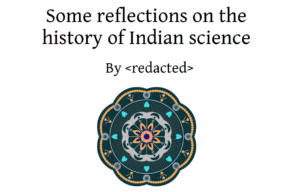
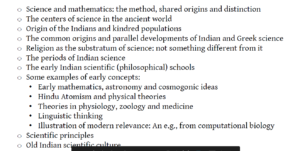
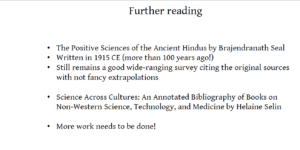
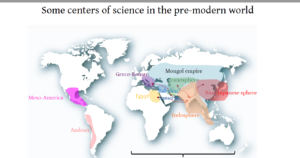
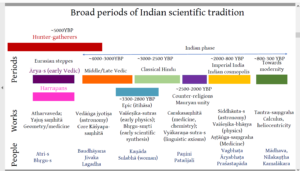
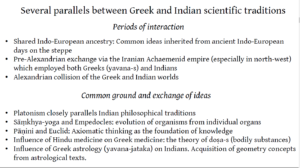
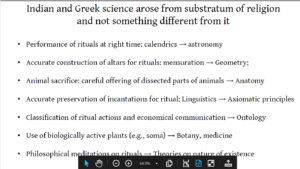
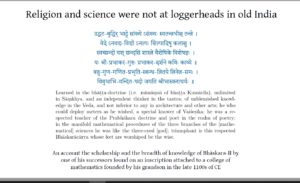
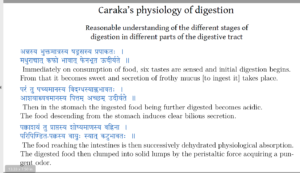
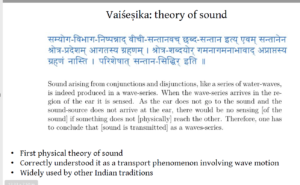
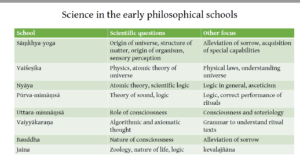
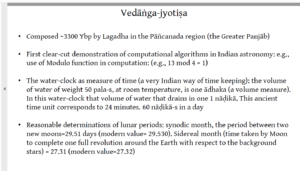
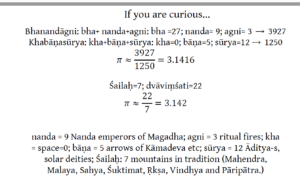
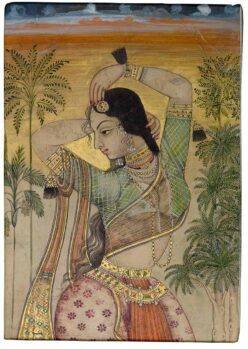
Omar sahab,
Surprised you did not know manastramgani handle on twtr. I found his blog/twtr here during innumerable threads on AIT/OIT.
On Hindu science, he is one of the rarer handles to the extreme right of bell curve.
The issue is Hindus have been disenfranchized from engaging with modernity from Hindu frameworks instead one can only be modern if one engages with it via Anglo-Western framings & throws everything else away into dustbin.
Sadly people who could synthesize modernity with Hindu framework are constantly decreasing while political opportunists {from either side} are gaining ground.
E.g. of the work so called South Asian scholars would avoid & go out of their way to dismiss everything ‘non-modern’.
https://www.academia.edu/1088859/Medical_Error_Medical_Truth_The_Placebo_Effect_and_Room_for_Choice_in_Ayurveda
Check – http://ayuryog.org/ {Research project in which many scholars have been participating}
Here are some interesting papers –
https://www.academia.edu/492303/The_Doctors_Assistant_Nursing_in_Ancient_Indian_Medical_Texts
https://www.academia.edu/71969620/The_Evidence_for_Hospitals_in_Early_India
https://www.academia.edu/30576715/From_Balkh_to_Baghdad_Indian_Science_and_the_Birth_of_the_Islamic_Golden_Age_in_the_Eighth_Century
https://www.academia.edu/207365/Post_Classical_Indian_Traditions_of_Medical_Debate_and_Argumentation
https://www.academia.edu/172760/Interpreting_the_Image_of_the_Body_in_Pre_Modern_India
https://www.academia.edu/75461325/Ayurveda_Philology_and_Print_On_the_First_Printed_Edition_of_the_Carakasa%E1%B9%83hit%C4%81_and_Its_Context_South_Asian_History_and_Culture_2022_
https://www.academia.edu/88226083/With_the_Eye_of_a_Scholar_and_the_Insight_of_a_Physician_Gangadhar_Ray_Kaviraj_and_the_Carakasa%E1%B9%83hit%C4%81_2022_
https://www.academia.edu/207369/The_Questions_of_King_Tukkoji_Medicine_at_an_Eighteenth_Century_South_Indian_Court
https://www.academia.edu/77721321/The_Usman_Report_1923_Translations_of_Regional_Submissions
https://www.academia.edu/12713803/_On_Perfecting_the_Body_Ras%C4%81yana_in_Sanskrit_Medical_Literature_AION_sezione_filologico_letteraria
Further reading –
Body and Cosmos Studies in Early Indian Medical and Astral Sciences in Honor of Kenneth G. Zysk –
https://brill.com/edcollbook/title/57614#bht.0def9f20-5586-4dc9-ade8-9ff903239377.7
ʿAlī ibn Sahl Rabban aṭ-Ṭabarī: The Indian Books
The Sanskrit, Syriac and Persian Sources in the Comprehensive Book of Rhazes
Upcoming –
Science and Society in the Sanskrit World
————————————————————-
Related to above topic indirectly –
History of Placebo –
https://www.academia.edu/96682620/Therapeutic_Healing_and_the_Placebo_Effect_The_comparative_historical_journey_from_Qus%E1%B9%AD%C4%81_ibn_L%C5%ABq%C4%81_s_medicinal_power_of_persuasion_or_suggestion_to_open_label_placebos_
The liver doctor is a Keralite who is probably suffering from an excess of Ayurvedic advertising in his home state.
I believe the underlying principles, vatha-pitha-kabha etc are a bunch of woo-woo, it will be tough to reconcile with modern medicine. One can say that the biochemical understanding of human body (keeping philosophical materialism aside) isn’t complete but the scientific method ensures that the understanding will continuously improve. AFAICT the Ayurvedic principles are fossilized.
Having said that, I believe there is a treasure trove of compounds in the herbs used by Ayurveda, Siddha and other native traditions. The low-hanging fruit is to do biochemical research to identify specific active compounds, do extensive drug testing, play the patent game and bring them to market (I still see only the name of the herb species on Ayurvedic/Siddha drug labels). Since the herbs are native to the subcontinent, Western research on these should be limited. India should get on this yesterday; no point in crying when Western labs do the same. But I doubt a policy framework will come out of legislators who see a connection between Susrutha’s nasal reconstruction and Ganesha’s head.
@Naveen you are the perfect e.g. of a person who has not taken time to understand how framework differences leads to diff. ques., ans. & exp.
Auyurvedic ingredients are suppossed to be used as whole {& freshly prepared} as they are found in nature unlike allopathic approach of extracting ‘active ingredient’ & then preparing a ‘drug delivery’ mechanism for it.
E.G. – Dadi maa ke gharelu nuskhe
https://qz.com/india/689772/turmeric-milk-an-ancient-indian-remedy-has-become-the-new-hipster-trend-in-the-west
Yes there many quacks who have made false claims like curing cancer abt. traditional medicines thus making them easy target of ‘critique’ in name of rationalism.
For e.g. –
Many simpler formulations could be prepared at home using everyday & local foods like Triphala & were developed with intention of living healthy lives & not primarily for treating diseases.
The basic diff. is Indic conceptions never separated humans from natural world thus they developed a diff. mode of living & treating diseases… so rather than throwing baby out with bath water try to understand different approaches of each system & their utility in contemporary world.
This non differentiation of human & natural world is the central difference b/w West & non-West.
https://t.co/HyQPK7D3qZ
This rational colonialized brown sahib will not get into this western vs non-western debate. I will simplify my question this way – what is the biochemical pathway for native medicines, doesn’t matter whether they are taken whole and fresh or in the form of capsules, syrups, tablets with a Himalaya/Dabur label or in the form active ingredients? If you say that’s a wrong question to ask, then we don’t have a common ground to discuss. We’ll stop here.
Also what’s the deal with West differentiating between human and natural world. Fleming did not synthesize Penicillin in a lab away from nature. Many western medicines starting from the simple aspirin have their origins in nature. This dumb rationalist thinks that your rhetoric is a form of appeal to nature.
Many of today’s Western medical practices like Vaccination sit on the shoulders of earlier Eastern practices. So no point in crying appropriation if someone takes it from us and does it better than us.
// This rational colonialized brown sahib will not get into this western vs non-western debate. //
This simply shows your ‘rational’ conservatism & preconceived notions.
// what is the biochemical pathway for native medicines, doesn’t matter whether they are taken whole and fresh or in the form of capsules, syrups, tablets with a Himalaya/Dabur label or in the form active ingredients? If you say that’s a wrong question to ask, then we don’t have a common ground to discuss. We’ll stop here. //
I agree with you here since that ques. can only be asked from modern Scientific perspective but not from Ayurvedic perspective. Nobody is stopping you in developing novel methods of testing but then it may require engaging with a framework you deem useless & irrational.
// Also what’s the deal with West differentiating between human and natural world. Fleming did not synthesize Penicillin in a lab away from nature. Many western medicines starting from the simple aspirin have their origins in nature. This dumb rationalist thinks that your rhetoric is a form of appeal to nature. //
No rhetoric from me, you can check ‘Anthropocene’ debate yourself.
// Many of today’s Western medical practices like Vaccination sit on the shoulders of earlier Eastern practices. So no point in crying appropriation if someone takes it from us and does it better than us. //
‘Better’ is a matter of perspective e.g. euthanasia debate {merciful death Vs. longer painful dependent life allowed for by modern healthcare developments}. More than appropriation the real issue is displacement of many worldviews which allowed for various approaches to a particular problem.
As I said above, engaging it from existing medical framework will be very tough because there are philosophical differences. My point is the framework may be useless, but the herbal preparations might have some value. Extracting that value doesn’t need any agreement on fundamental principles. My concern is that if India doesn’t extract that value someone else will will down the line.
I don’t know what that debate means. I have seen that word used when referring to global warming and human impact on the natural world, but don’t understand the context here. Care to enlighten me?
I don’t see any conspiracy to displace worldviews. There is plenty of space to bring alternate worldviews and explain natural phenomenon e.g. epigenetics.
I have no idea what’s the point here, and why is better in quotes? Also I don’t see the relevance of euthanasia here. We get sound advice from medical doctors on the condition of the patient and they leave it up to us whether to decide on a merciful death or just prolong the inevitable. Obviously doctors don’t want to make that decision so they leave it up to the family to decide. Indian constitution recognizes the right to refuse treatment for a death with dignity (passive euthanasia). Active euthanasia is totally a different matter. Ultimately, Euthanasia isn’t a medical debate, it remains in the social/legal domain.
// Extracting that value doesn’t need any agreement on fundamental principles. My concern is that if India doesn’t extract that value someone else will will down the line. //
As i said anyone can engage & do testing of Ayurvedic preprations but doing so using only modern Healthcare perspective would be wrong & thus i talked about need for engaging modernity with Indic perspective in my Ist response.
Another issue with your insistance on extracting value is that it reduces all resources to value instead of other frameworks like local sustainance models {which we would not be debating had Human-Nature distinction based disruptions not came abt.}
// I don’t know what that debate means. I have seen that word used when referring to global warming and human impact on the natural world, but don’t understand the context here. Care to enlighten me? //
Anthropocene debate is all abt. Human-Nature distinctions & how it has affected human frameworks & activity affecting nature which in turn affect lives of species on planet including humans like Urban evolution, Climate change etc.
// More than appropriation the real issue is displacement of many worldviews which allowed for various approaches to a particular problem. //
Any framework with which humans stop engaging gets destroyed overtime because it stops developing with newer/different advancements or understandings.
// I have no idea what’s the point here, and why is better in quotes? Also I don’t see the relevance of euthanasia here. We get sound advice from medical doctors on the condition of the patient and they leave it up to us whether to decide on a merciful death or just prolong the inevitable. Obviously doctors don’t want to make that decision so they leave it up to the family to decide. Indian constitution recognizes the right to refuse treatment for a death with dignity (passive euthanasia). Active euthanasia is totally a different matter. Ultimately, Euthanasia isn’t a medical debate, it remains in the social/legal domain. //
Your paragraph is the perfect e.g. of this – ‘Better’ is a matter of perspective & why i mentioned euthanasia debate since there are many possible ways of approaching the issue & has been debated extensively in modern healthcare, same is true for many other issues as well.
Openness to engage with traditional framework does not affect once progressiveness, E.g. –
https://www.deccanherald.com/sunday-herald/sh-top-stories/dr-muthulakshmi-reddy-a-positively-rebellious-force-1132955.html
https://www.thehindu.com/books/books-reviews/muthulakshmi-reddy-cancer-doctor-feminist/article65684501.ece
https://theprint.in/pageturner/muthulakshmi-reddy-allopathic-surgeon-who-turned-to-sanskrit-medicine-when-nothing-worked/1084234/